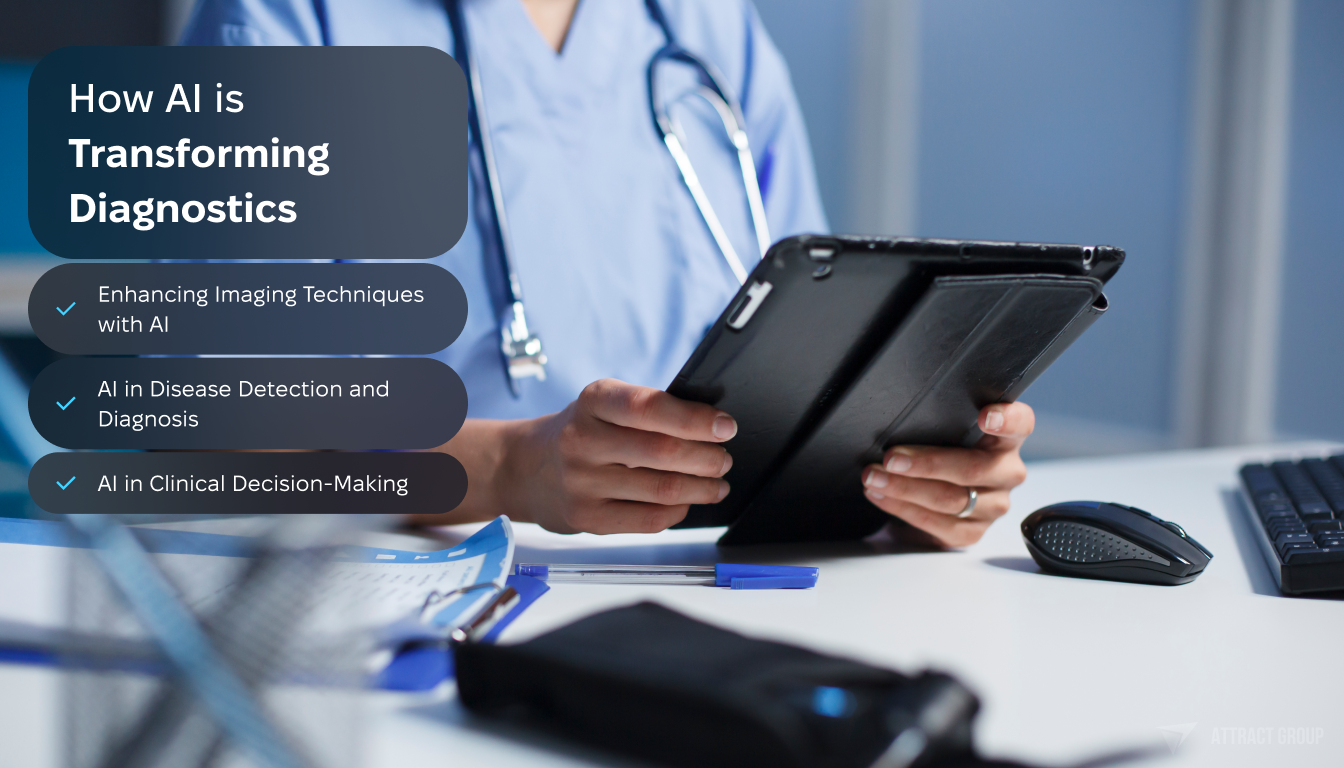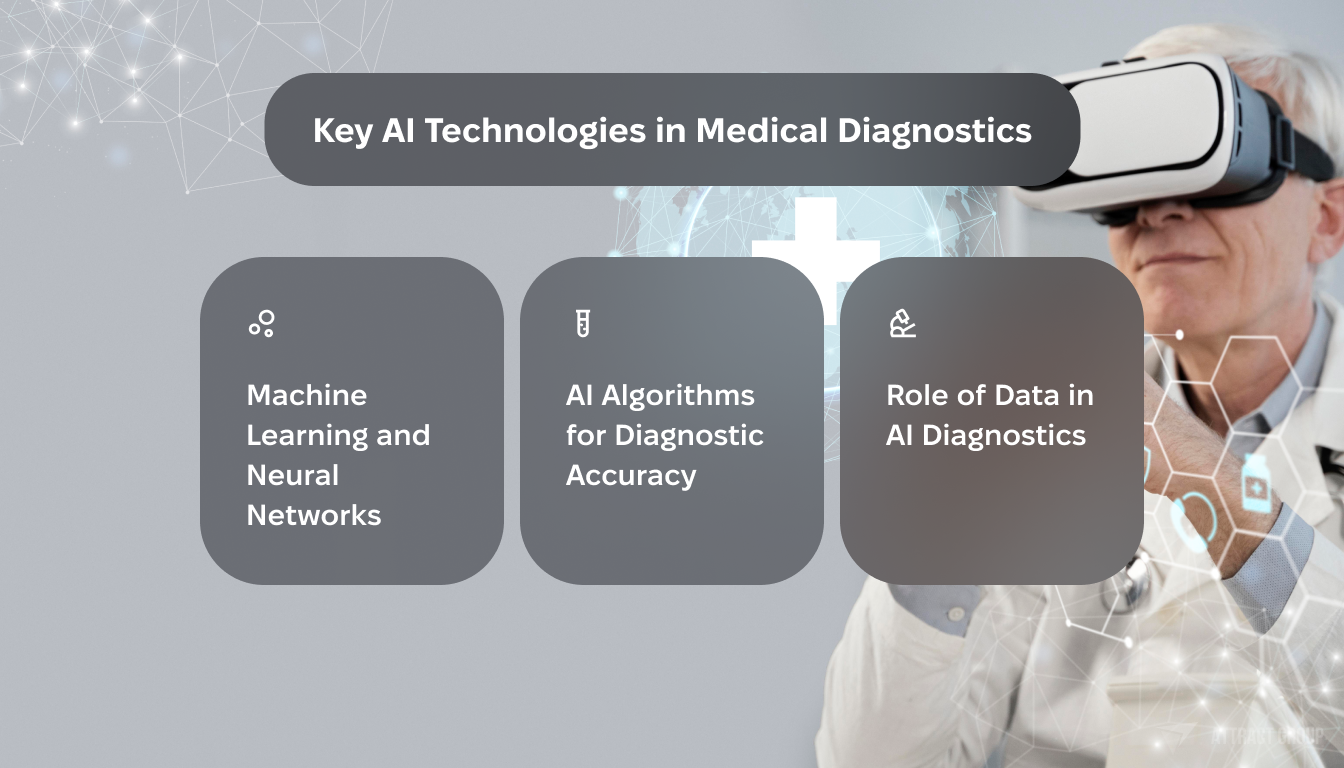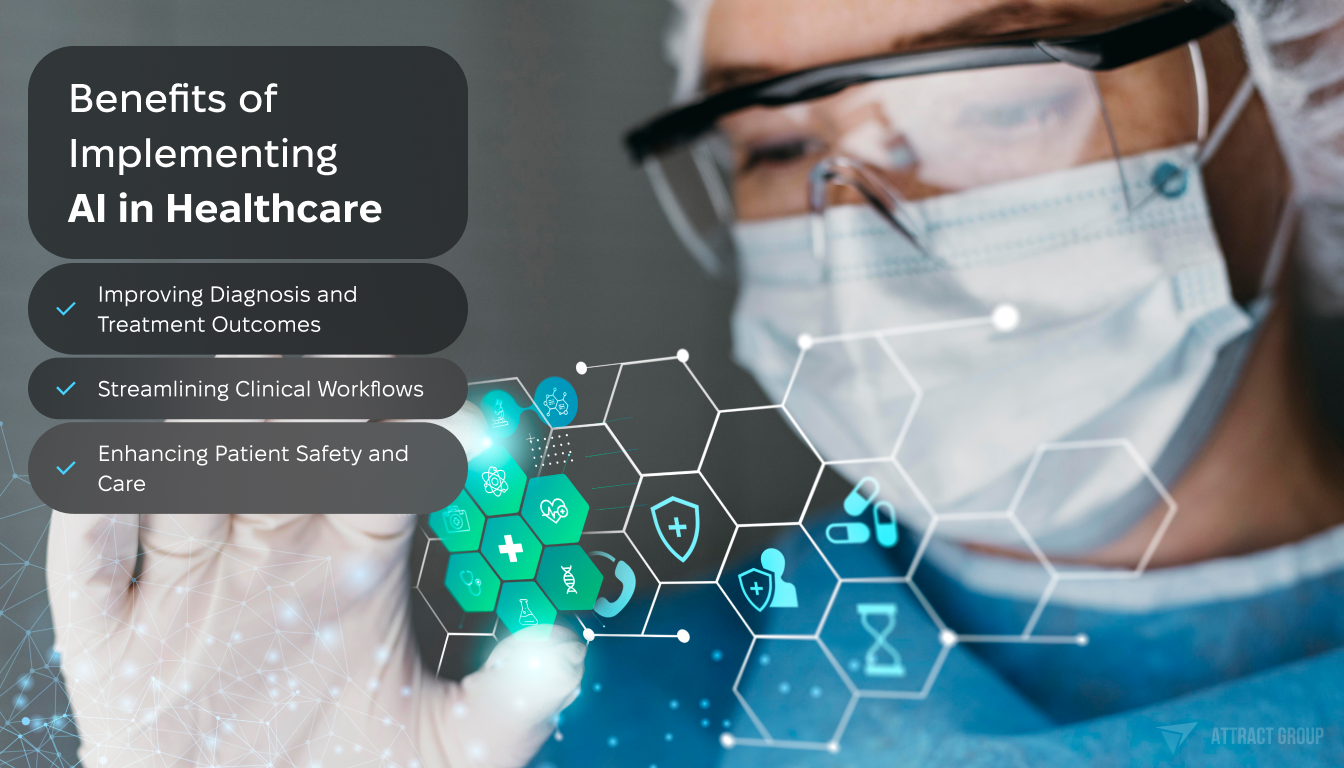AI Powered Medical Diagnostics: Artificial Intelligence in Healthcare Decision-Making
 2 October 2024
2 October 2024Artificial intelligence (AI) is changing healthcare, especially in diagnosing diseases. Medical AI is growing fast. It brings new abilities that make healthcare decisions better. Such advances are not just ideas for the future. They are real and are making diagnoses more accurate. This leads to care that is tailored to each patient and improves overall health.
Studies like Futurescan 2023 show why health systems need to keep up with this tech growth fast. AI in healthcare is shown to help in many areas. It improves how patient complaints are handled. It plays a key role in identifying tough diseases like cancer, heart issues, and infections. As AI grows in diagnostic medicine, we must ensure it is used ethically and keeps data safe.
Key Takeaways
- Advancements in AI technology are reshaping healthcare decision-making, making it more precise and patient-centric.
- Medical professionals are leveraging AI-based tools for enhanced diagnostic accuracy and improved healthcare delivery.
- Studies emphasize the importance of ethical frameworks and data protection in the application of AI in health care.
- AI for medical diagnosis is making strides in imaging, pathology, and several medical specialties, contributing to earlier and accurate disease S.
Its prominence in medical education is preparing future healthcare providers to work effectively alongside this technology.
- AI is also empowering patients by personalizing care and streamlining processes like remote monitoring and medication management.
The Evolution of AI in Medical Diagnostics
The start of AI in medical diagnostics in the 1970s was a game changer. It led to huge milestones that changed healthcare delivery. Systems like MYCIN and newer models have made diagnostics more accurate. They’ve also allowed for using different types of data in assessing patients.
The last ten years have seen a huge growth in AI in medicine. This includes technologies like convolutional neural networks that help in analyzing medical images. AI now uses data from health records, genetics, and wearables to give a full picture of a patient’s health. It also offers predictions about health outcomes.
Tools like CORTEX by XSOLIS are at the forefront, improving how clinics operate. According to the World Economic Forum, by 2030, AI will greatly improve how care is connected, diagnostics are predicted, and patients experience healthcare.
How AI is Transforming Diagnostics
AI is changing the way doctors diagnose and treat patients. It makes healthcare faster and more accurate. This is because machine learning and expertise in medicine are coming together.

Enhancing Imaging Techniques with AI
AI makes imaging like X-rays and MRIs better. It quickly checks images for signs of disease. This means doctors can find and monitor diseases better than before.
AI in Disease Detection and Diagnosis
AI can look through lots of health data to spot diseases early. Tools like deep convolutional neural networks are as good as skin doctors in finding skin cancer. This helps catch diseases sooner, which can save lives.
AI in Clinical Decision-Making
AI gives doctors helpful data to make better choices. It looks at patient info to suggest what to do next. It helps with diagnosing and planning the treatment, making the doctor’s job easier.
AI helps start treatment early and makes it fit the patient better. This leads to better results and happier patients. It’s a big step forward in making healthcare better for everyone.
| AI Application | Benefits | Specific AI Technology |
|---|---|---|
| Imaging Techniques | Increased detection accuracy, faster processing times | Deep Learning Algorithms |
| Disease Detection | Early detection, high diagnostic accuracy | Convolutional Neural Networks |
| Clinical Decision-Making | Real-time data analysis, predictive insights | Data Analysis Algorithms |
Key AI Technologies in Medical Diagnostics
Healthcare and artificial intelligence (AI) together are making big changes in medical diagnostics. They use advanced AI like machine learning, neural networks, and smart algorithms. All of this is powered by the importance of data. Let’s take a look at how these technologies are changing the way we diagnose illnesses.

Machine Learning and Neural Networks
Machine learning and neural networks are at the forefront of improving healthcare with AI. They analyze lots of medical data, such as images and vital signs. This helps find more details about a patient’s health. Neural networks are great at finding complex patterns in big data sets. This makes disease diagnosis faster and more accurate. For example, doctors use neural networks to get better readings from X-rays, which reduces mistakes.
AI Algorithms for Diagnostic Accuracy
AI algorithms play a key role in making diagnoses more accurate. They use data from different places, like gene maps, MRI images, and medical histories. These algorithms get better at predicting and finding diseases. Quantum AI algorithms are really good at looking at lots of data quickly. This leads to diagnosing diseases sooner and more precisely. One important use has been in spotting liver diseases, with some AI models hitting 100% accuracy.
Role of Data in AI Diagnostics
Data is very important in AI-based diagnostics. AI needs lots of high-quality data to make smart conclusions. This data comes from health records, images, and more. There are still challenges, like keeping data safe and private. But, using data well is a key part of AI diagnostics. By using different kinds of data together, doctors can make better decisions in tough medical situations.
The way AI technology is used in diagnosing diseases is always getting better. With machine learning, neural networks, and strong AI algorithms that analyze lots of data, healthcare is becoming more efficient and accurate.
Discover cutting-edge AI solutions that improve diagnostic accuracy and enhance your healthcare decision-making capabilities.

Practical Applications of AI in Healthcare
Artificial intelligence (AI) is transforming healthcare, moving from theory to practical applications of AI. These advancements boost patient outcomes and make care processes smoother. We’re seeing AI improve how patients experience healthcare and provide better education and tools for those working in the field.
AI in Patient very practical Care Management
AI in patient care is changing the game for healthcare workers and patients. It helps monitor patients in critical care by analyzing vast amounts of data. This leads to less complications and faster recovery times. Such technologies not only save lives but also cut down on healthcare workers’ workloads. This gives them more opportunity for patient interaction.
AI Tools for Medical Professionals
Using AI tools for professionals in medicine greatly improves diagnostic accuracy and treatment plans. AI aids in surgeries and typically means less pain and quicker healing for patients. Companies like Pfizer and Takeda use AI to speed up new drug development. This boosts clinical trial success rates and brings treatments to patients faster.
AI has also made big strides in diagnostics. It’s especially impactful in reducing false positives and negatives in breast cancer screening. It’s more accurate than traditional methods by radiologists.
AI in Medical Education
The impact of AI in medical education is growing. AI-powered simulations and virtual labs make complex medical information easier to grasp. This improves learning. Studies show AI can deliver educational content in a personalized way. It adapts to each learner’s pace and style, better preparing future professionals and updating current ones.
AI is not just advancing medical practice and education but is fundamentally changing our approach to health challenges worldwide. It’s steering us towards a future of insightful, efficient, and patient-focused care.
Benefits of Implementing AI in Healthcare
Artificial intelligence (AI) is changing healthcare in big ways. It’s making medical care and operations better. We’ll look at these improvements with stats and facts.

Improving Diagnosis and Treatment Outcomes
AI helps doctors diagnose diseases more accurately. For example, AI algorithms have led to a 40% improvement in healthcare results. AI also does well in spotting skin cancer early, outdoing doctors in some cases. Plus, it speeds up the creation of new medicines, avoiding expensive tests.
Streamlining Clinical Workflows
AI makes healthcare processes smoother. It can cut treatment costs by half, easing financial stress. 64% of patients like that AI offers non-stop support, much like what nurses provide. This improves how things run in hospitals. AI tools, including telemedicine, help treat more people, even in distant places.
Enhancing Patient Safety and Care
AI plays a big role in keeping patients safe. It watches over patients closely, alerting doctors to any danger signs early. This lowers risks, which is very important for patients with serious conditions. With AI, care becomes more preventive and tailored, increasing patient safety and customization.
AI in healthcare brings many positives. It boosts safety, makes operations efficient, and fine-tunes diagnosis and treatment. The AI healthcare market is set to hit USD 187 billion by 2030. This shows AI’s huge promise in revolutionizing care, making it better and more centered on patients.
Challenges and Considerations
Artificial intelligence (AI) is changing healthcare in big ways, much like it has in other areas. But, bringing AI into healthcare isn’t simple. We face tough issues like ethics, data privacy, and fitting AI into our current health settings. All these challenges need careful thinking and detailed planning.
Ethical Implications of AI in Healthcare
AI changes how doctors and nurses do their jobs. The main worries are about decision-making, patient freedom, and keeping human touch in care. We must watch these changes closely. That’s because AI’s fast growth might risk these important elements. This could affect how well hospitals work and how much they spend.
Data Privacy and Security Challenges
AI needs lots of health data to work well. Keeping this personal info safe is very important. Laws like the GDPR in the EU set rules to protect this data. Yet, it’s tough to keep data safe from hacks. This is harder because healthcare places differ a lot in how they protect their data.
Integration Challenges in Health Systems
Putting AI into current health systems is full of challenges. These include tech limits, different work cultures, and lack of money for new tools. Also, AI must work well in real life, follow laws, and fit into how hospitals work. This requires tech people, healthcare experts, and government officials to work together well.
| Issue | Impact | Potential & Solutions |
|---|---|---|
| Ethical Concerns | Could diminish patient trust and alter clinical roles | Promote ethical guidelines and continuous professional education |
| Data Privacy | Risk of breaches leading to legal repercussions | Enhance cybersecurity measures; adhere to international data protection laws |
| Integration with Health Systems | Diverse regional capabilities delay uniform AI adoption | Develop tiered implementation plans accommodating different health infrastructure |
Conclusion: The Impact of AI on Healthcare Decision-Making
The impact of AI on healthcare is huge and widespread. Various studies, like the 2018 report by the Canadian Association of Radiologists, show this. AI is changing medical diagnostics in big ways. It has made strides in areas like radiology and mental health care. AI in decision-making shows great promise. It’s making things more accurate and cutting treatment costs by up to 50%. It also boosts patient outcomes by 30% to 40%.
In the future of healthcare AI, we expect AI to be more common in day-to-day clinical work. The AI healthcare market might reach $6.6 billion by 2021. Experts think AI will play a bigger role, especially in radiology. AI could check images before doctors do. This means faster and more precise diagnoses. Healthcare workers and AI will work closer together. This will make medical care better, with a focus on the patient.
But, advancing AI in healthcare isn’t easy. We must consider ethics, data privacy, and the accuracy of AI. Working closely with AI is crucial. There are also challenges to blend AI with existing health systems. The National Library of Medicine believes AI can make healthcare smarter and more efficient. The healthcare industry needs to keep innovating and working together responsibly. By doing so, we embrace AI’s power to change healthcare for the better in our century.
FAQs
How does AI in healthcare impact health insurance policies and coverage?
AI in healthcare is reshaping insurance policies and coverage. As AI improves diagnostics and treatment outcomes, insurers are adapting their models. AI algorithms can help assess risk more accurately, potentially leading to more personalized premiums. Additionally, the use of AI in preventive care might encourage insurers to cover AI-powered diagnostic tools and treatments. However, this also raises questions about data privacy and the ethical use of AI in determining coverage. Insurers and healthcare providers must work together to ensure that AI integration benefits patients while maintaining fair and accessible coverage.
What are the potential job market changes for healthcare professionals due to AI integration?
The integration of AI in healthcare is likely to transform the job market for medical professionals. While AI may automate certain tasks, especially in diagnostics and imaging, it’s unlikely to replace healthcare workers entirely. Instead, the focus will shift towards skills that complement AI, such as interpreting AI-generated insights and providing empathetic patient care. New roles may emerge, such as AI-healthcare liaisons or medical AI ethicists. Medical education will need to evolve, incorporating AI literacy alongside traditional clinical skills. This shift may lead to increased efficiency in clinical practice, allowing healthcare professionals to focus more on complex decision-making and patient interactions.
How can patients actively participate in AI-driven healthcare systems to improve their own care?
Patients can play a crucial role in AI-driven healthcare by engaging with AI tools and providing accurate data. This might involve using AI-powered health apps or wearable devices that monitor vital signs and symptoms. By sharing this data with their healthcare providers, patients contribute to more accurate diagnoses and personalized treatment plans. Patients can also educate themselves about AI in healthcare to make informed decisions about their care. Additionally, participating in medical research that utilizes AI can help improve AI models and advance the field of medicine. Active patient engagement with AI systems can lead to more proactive and preventive healthcare approaches.
What role does AI play in addressing global health disparities and improving healthcare access in developing countries?
AI has the potential to significantly impact global health disparities, especially in developing countries with limited healthcare resources. AI-powered diagnostic tools can help bridge the gap in areas with a shortage of medical professionals. For instance, AI algorithms can analyze medical imaging in regions lacking specialist radiologists. Telemedicine enhanced by AI can improve access to healthcare in remote areas. AI can also assist in predicting disease outbreaks and optimizing resource allocation in resource-poor settings. However, challenges remain in implementing AI in developing countries, including infrastructure limitations and the need for culturally appropriate AI models. Addressing these challenges could help AI play a crucial role in reducing global health inequalities.
How might AI in healthcare evolve with the advent of quantum computing technologies?
The combination of AI and quantum computing could revolutionize healthcare even further. Quantum computing’s immense processing power could enable AI to analyze complex medical data at unprecedented speeds. This could lead to breakthroughs in drug discovery, as quantum-powered AI could simulate molecular interactions more accurately. In medical research, it could help unravel complex genetic patterns related to diseases. Quantum AI might also enhance the accuracy of diagnostic imaging and improve personalized medicine by processing vast amounts of patient data instantaneously. However, integrating quantum computing with existing AI systems in healthcare will require significant advancements in both fields. As these technologies converge, they could open new frontiers in understanding and treating complex medical conditions.










